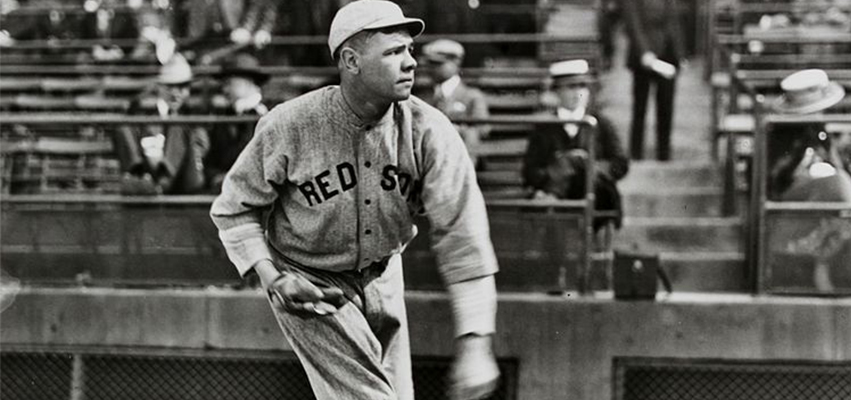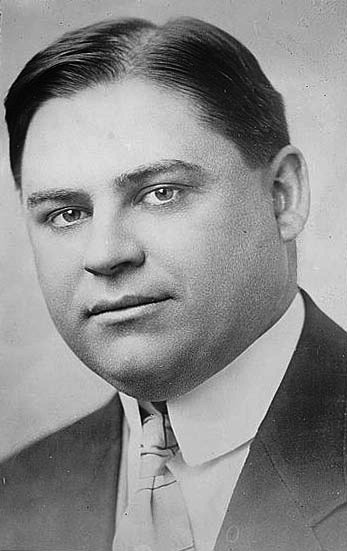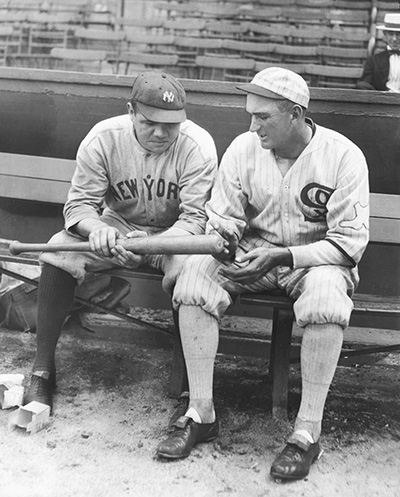From the Hub of the Universe, the Curse of the Bambino

Just over a century ago, a budding superstar named Babe Ruth was sold to the New York Yankees, skyrocketing both toward iconic status as the greatest names in American sports history.
Meantime, the after-effects rippled well beyond the national pastime. John Thorn, the official historian of Major League Baseball, told the New York Times in 2019, “If Boston was the cultural capital of 19th century America, New York City became the cultural capital of 20th century America when Babe Ruth arrived.”
Dumb luck? More like shortsighted greed. And you can blame an accidental innovator from Peoria.

Boston Red Sox owner Harry Frazee, fed up with Ruth’s off-field misbehavior and outlandish contract demands, made the cash deal to buoy a bottom line plagued by his foundering Broadway musicals. For unloading Ruth, he would be bad-mouthed by baseball fans – in Boston and elsewhere – for cursing the Red Sox with more than eight decades of failure.
Both of Frazee’s careers – baseball and theater – started in his hometown of Peoria.
In the mid-19th century, part of the Frazee clan left New Jersey for the Midwest. Henry B. Frazee landed in Peoria, where he ran a pumping company and married Margaret Teal.
They would have four children, including Harry Frazee, who was born on June 29, 1880 on Warner Avenue, now Southwest Jefferson Avenue. As a teen, Harry played baseball with the minor-league Peoria Distillers. He also bought a semi-pro squad, taking it on barnstorming tours and turning a good buck.
Off-season, he pursued his other love: the theater. He worked as a prop boy at the Grand Opera House and later as assistant manager at the Peoria Theater. He dropped out of Peoria High School, leaving town to eventually become an advance man for traveling shows.
As a young man, he found a toehold in Chicago, where he built the Cort Theatre in 1907. He then left for Broadway, where he bought the famed Longacre Theater and produced shows, some of them smashes. He branched into boxing promotion, which made him a millionaire by 1915.
The next year, the Red Sox won the World Series. The squad was led by Ruth, not yet a feared hitter but an imposing pitcher with a record of 23-12. After the season, Frazee bought the team for $675,000.
In 1917, Ruth had another outstanding season on the mound, with a 24-13 record. But after finishing second, the manager decided to get the free-swinging Ruth more at-bats.
He flourished at the plate in 1918, tying for the league lead in home runs, with 11 – an outstanding tally in the dead-ball era. Propelled by Ruth, the squad again won the World Series.
Ruth would have a breakout season in 1919, walloping an astronomical 29 home runs – no one else hit more than 10 — while topping multiple slugging categories. The nation’s sports headlines blared his exploits.
Meantime, Frazee was frazzled.
His theatrical productions limped along at the box office. The Red Sox filled the stands, but not with enough fans to cover the debt incurred by Frazee’s purchase.
Plus, Ruth could be a headache. His big mouth and off-field carousing riled the team’s manager and irritated Frazee.
Things were about to get worse.

Ruth, at just 24 years old, had signed a three-year contract that spring for $10,000 annually but felt he deserved more. After the season, while enjoying the West Coast high life, he told reporters that he expected Frazee to double his salary.
Instead, Frazee quietly talked to other teams. The White Sox made an attractive pitch: $60,000, plus star Shoeless Joe Jackson, for Ruth. But the Yankees, whose owners were Frazee pals, offered a record $100,000, plus a $300,000 loan, and Frazee jumped on it.
He publicly vowed to use the money to buy top-notch ballplayers to boost the Red Sox. And he said of the Yankees, “I do not mind saying I think they are taking a gamble,” according to the New York Times.
The deal really did turn out to be one-sided…in the Yankees’ favor. The next season, Ruth – appeased by a contract for $20,000 yearly — whacked an astronomical 54 homers. Over 15 years, he would lead the Yankees to seven American League pennants and four World Series titles. Nicknamed “The Bambino” and “The Sultan of Swat,” he would power his way to iconic status as the greatest baseball player ever.
But Frazee’s New York largesse didn’t stop with Ruth. He would trade other stars to the Yankees and get little in return. During Ruth’s domination with the Yankees – who in 1923 opened Yankee Stadium, dubbed “The House That Ruth Built” – the Red Sox would finish dead last nine times.
Alas, Frazee did not stick around for all that failure. In 1923, he sold the Red Sox for $1.15 million to focus on producing musicals.
He enjoyed Broadway success, but only briefly. Frazee died on June 4, 1929, of a kidney ailment. New York Mayor Jimmy Walker delivered his eulogy.
But kind words would be hard to come by elsewhere, especially in Boston. For the rest of the century, the Red Sox would see only occasional success, and never a title. The grumbling over Frazee and “The Curse of the Bambino” intensified. Frazee’s name remained vilified until Boston finally won a World Series in 2004.
By then, his family long had vanished from Peoria, where only the most ardent baseball fans know of his inadvertent contribution to the national pastime and to pop culture. All of that happened because a baseball-loving teen left town to chase his dreams.

Phil Luciano is a senior writer/ columnist for Peoria Magazine
and content contributor to public television station WTVP.
This story includes information from the Rockford Morning Star, New York Times, The Society for American Baseball Research, Sports Illustrated and Wikipedia.org

